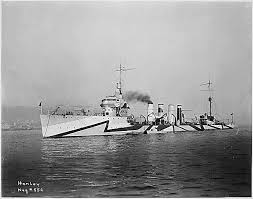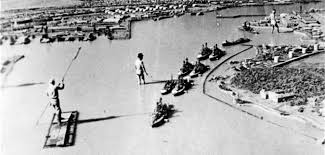Franklin Delano Roosevelt, the
man who coined December 7, 1941, “a day that will live in infamy,” may have
been the cause of the Pearl Harbor tragedy (Dallek 1). Sitting in the backseat
of a vehicle called the 1930s Depression heading for the edge of a cliff,
America had not been as vulnerable or so poised for war since its birth. Just
two decades earlier, Americans experienced the pride and roaring economy which
followed World War I. Yet, overspending and drought left America destitute throughout
the 1930s. By 1940, President FDR was ready for an answer to jolt America onto
a new course. As the holiday season of 1941 began, an opportunity presented
itself that many believe no politician could resist. While a naïve country
awoke to the single, most devastating attack ever to take place on American
soil, a conspiracy by America’s own President was being played out that few
would ever become aware of or believe even today. The conspiracy declares that
Roosevelt was complicit in the United States’ entry into World War II by
"manipulated events in the Pacific provoking Japanese attack" (1).
Additionally, "defensive measures" and "deceitful tactics"
lead decisively to war (1). Those measures which lead the conspiracy debate
include months of financial sanctions which put Japan at odds as well as
Roosevelt’s own decision to send America’s aircraft carriers out to sea from
Pearl Harbor days before the attack.
For
insight as to the conspiracy behind the WWII machine, consider the man,
himself. The slender and tall relative to the popular Teddy Roosevelt, Franklin
Delano Roosevelt was “charming, gregarious and fun loving, always eager to
sail, party and enjoy the company of women, other than his wife, Eleanor”
(Murrin et al. 675). Outwardly, Roosevelt painted himself the decisive
candidate in any political race and easily won the governorship of New York at
thirty-nine. But Franklin Roosevelt was raised to value stewardship and
service; and, by 1933 when he was elected United States President, he begin a
New Deal to repair a drowning America that would see him dedicating himself fully
to his people employing vital economic policy helping farmers and bankers, as
well as the poor ( Murrin et al. 681). It is important to note within the
progression toward World War II that Roosevelt designated himself the savior in
a tumultuous sea, service above self as well as a financial genius capable of
global prediction.
Though
Franklin Roosevelt could draw his lineage back to the Mayflower and was born to
a prominent family in Hyde Park, his inner struggle with health bred in
Roosevelt a compassion for the downtrodden that would later entrust him to both
mothers and fathers, and leaders worldwide (Murrin 675). Upon his two-year
confinement with polio and subsequent paralysis, Roosevelt acquired an intense
determination and focus as well as a solid bond to Eleanor. During Roosevelt’s
first two terms as President, the United States suffered its worst economic
depression since its birth. While Roosevelt suffered with his own paralysis,
so, too, did his country. Like two wounded soldiers, they became inseparable,
neither to be left behind. Along with economic reform, Roosevelt renewed a
sense of patriotism by using the United States Eagle Emblem on all New Deal,
NRA and Tennessee Valley Authority governance, even causing an eagle-shaped
sunburn on the backs of bathing beauties in his New Deal campaign (Murrin et
al. 682). A 1931 movie, All’s Quiet on
the Western Front had cautioned America on military recruitment by leaders,
but a more recent Mr. Deeds Goes to Town in
1936 celebrated hometown heroes (Murrin 682). It should come as no surprise,
then, the great sense of responsibility Roosevelt felt in keeping his country
safe, being the big brother, as the decade ended and Hitler’s forward motion
gripped the world with fear.
Roosevelt
unified Americans from all backgrounds with his liberalism and strong
government inspiring millions to participate (Murrin et al. 700). By late 1938,
many economic reforms lost funding and America began to slump back into
depression. So, too, was Roosevelt struggling with being seen as disabled when
he saw world powers intensifying. He went to great lengths to be seen standing
with his braces or sitting at the radio with his “fireside chats” sensing that
America needed to be regarded as strong and capable (Murrin et al. 679). Though
the US sentiment following WWI was one of neutrality in foreign policy,
Roosevelt, a prior Naval Secretary, knew exactly where he must stand, beside
the rights of all people. Roosevelt’s passion and sense of protection over
America gave him a clear conviction for joining WWII, but his sense of honesty
gave him pause to conflict over the need to have his country on-board. Until he
could launch a response, he would keep up appearances just as he did with his
leg braces. If by now, Roosevelt was conspiring, he was doing so in what he
would have thought to be in America’s best interest. A powerful Europe could
one day threaten American liberty.
Roosevelt’s most entrusted friend,
British Prime Minister Winston Churchill, would refer to his impatient
momentum, “Like the Mississippi, it just keeps rolling along” (Dallek 1).
Meanwhile, when asked what action he planned during his third Presidential
campaign in October 1941, Roosevelt promised, “I have said this before and I shall
say it again and again, your boys are not going to be sent to any foreign wars”
(1). Though Roosevelt believed “we must be the great arsenal of democracy,” he
knew it would be best if he entered the war with full support from the American
people, given the task that would be required (1). Roosevelt had shared his
sentiment during that same month with Russian and British leaders that an
atrocious act by the Axis powers would be necessary for Americans to take up
arms. Roosevelt also might suspect that if attacked, the potential war would
not be a foreign war, but a home-grown military response to aggression on
American soil (1). Roosevelt’s response to his constituents was, at times, on a
need-to-know basis as well as characterized by calculated semantics. 
Citizens
recently responded to a poll to assess the level of responsibility American
leadership shared, if any, in the Japanese attack on Pearl Harbor, December 7,
1941. By a landslide of sixty-two per cent, those polled believe the greatest
attack on American soil ever to occur was a complete surprise on the part of
the American government. Meanwhile, thirty-eight per cent of respondents were
inclined to believe Franklin Roosevelt, in some way, knowingly put in place
actions that resulted in an attack in order to antagonize brewing American
feeling towards foreign opposition and push Americans eagerly into WWII. By
reviewing events leading up to December, those supporting FDR’s innocence may
be inclined to recognize some action which could be considered complicit.
Though by the late 1930s many of FDR’s economic interventions had formed a new
America during the Great Depression, in late 1938 government funding had to be
removed from many supports due to waning funds (Murrin et al. 674). Across the
ocean, Japan was suffering, as well. At
war with China and attempting to unify with Germany and Italy, Japan needed to
show a strong front. By the spring of 1940, Roosevelt enacted sanctions in
regards to Japan that antagonized a country eager to flex its muscles (Dallek
1). America had great stores of refined fuel that Japanese fighter and bomber
planes needed. FDR loosened the Japanese hold on China when he blocked fuel
distribution to Japan. Though this was an economic measure, FDR knew the temper
he would incite by poking himself into Japan’s fight. In fact, during the onset
of the United States’ entry into WWII, “government war orders flooded factories
from 1941 on, causing the economy to grow vigorously, vanishing unemployment
and restoring prosperity to America” (Murrin p. 700). Other sanctions resulted
in the attack on an American ship, the Panay, within Asian waters putting
America on high alert. The relationship between the US and Japan by mid-1941 was
at a boiling point (Murrin et al. 705). Economics in America was back at a low,
opposition was committing atrocities abroad with American allies making war
more than just an answer, it was necessary in terms of humanity. FDR had
established himself early on in his governance as a humanist, and world events
were calling upon his action. Only complete ignorance upon the part of American
leaders could be the reason for Pearl Harbor to remain at ease that first week
of December, 1941, and FDR had proved himself over years in office to be
anything but ignorant or, for that matter, at ease in regards to foreign
policy.
A
former Secretary to the Navy, himself, it is thought that FDR would never
chance exposure of seamen to the tragedy they suffered. But, indeed, it could
have been FDR’s past knowledge that caused him to be incredulous to the
vulnerability that lay before him (Dallek 1).
Though FDR had promised not to send any soldiers to war on foreign soil,
an event was about to occur that would prevent his promise from becoming a lie.
FDR respected and revered his US military, but he was teetering on the edge of
his own declaration of war when he provided not only US supplies and ports but
US vessels in aid to Britain prior to the Pearl Harbor attack. He supported
China with more supplies and cut off Japan from “high-grade scrap-iron to raw
materials” (Murrin et al. 708). His own
congress was “becoming suspicious of foreign entanglement,” and they opposed it
in multiple sessions (Murrin et al. 707). Due to his level of faith in US
strongholds and military bravado, Roosevelt failed to consider the US weak or
penetrable in any area. Many in his inner intelligence believed that the
Japanese did not have the gall nor the mechanical ability to reach any US port.
By a few days following the attack on Pearl Harbor sinking nineteen ships,
downing 220 planes and killing 2,200 servicemen, some Americans charged that
“Roosevelt had intentionally provoked Japan in order to open a back door to the
war” (Murrin 708). The attack on Pearl Harbor had proven to be a catastrophic
failure of communication and evaluation of Japanese power. Though Roosevelt’s
intelligence community had received indication that the Japanese did, indeed,
plan an attack on the United States during the days prior, no high alert
whatsoever was scheduled. Coincidentally, all US aircraft carriers were ordered
by FDR from Pearl Harbor’s port into open waters and, thus avoided sure
destruction (Dallek 1). The US declared war on Japan by the next day, December
8, and entered WWII. The American President had ignored impending dangers and
allowed thousands to die at the hands of an enemy they had yet to know.
Though
technology did not exist at the time to fully comprehend Japanese codes, the
veil of accusation will always cast somewhat of a shadow on FDR’s responsibility
in failing to place Pearl Harbor on high alert in late 1941. The result is
history, but the loss suffered by the greatest military attack ever to occur on
American soil is so catastrophic as to consider the level of inadequacy that
allowed such an event. The failure was at least a monumental mistake and at
worst a planned conspiracy to nudge citizens into their second world war in two
decades. While the global atrocities merited response, the means is still
questioned today.
Works
Cited
Dallek, Robert. Pearl
Harbor and the “Back Door to War” Theory. Britannica.com.
Murrin, John, Hamalainen,
Pekka, Johnson, Paul, Brunsman, Denver, McPherson, James, Fahs,
Alice,
Gerstle, Cary, Rosenberg, Emily and Rosenberg, Norman. Liberty, Equality, Power: A History of the American
People, 7th Edition. Boston, 2016.

No comments:
Post a Comment